
31 minute read
news | the front line
BUSWAYS’ ADELAIDE METRO SUCCESS
NSW-BASED bus operator Busways has successfully transitioned its new Adelaide Metro workforce, using a ‘digital employee engagement’ app strategy to help overcome the challenges of the current pandemic, it explains.
By using a clever ‘social media’ technology, Busways adapted its interstate approach to move smoothly into its new Adelaide Metro contract’s two depots and welcome 215 new employees to the existing Busways 1,500+ workforce.
The company was selected by the South Australian government on March 11, 2020 to begin operating services for the Adelaide Outer South contract on July 5; the only new market entrant appointed in two tranches of bus contract tenders, it explains.
After 77 years of service in New South Wales it was the company’s first interstate expansion and made Busways’ Australia’s largest privately owned bus operator, it confirms. Throw state border closures and physical distancing rules into the mix and Busways had to get creative about employee engagement to achieve a successful workforce transition, it says.
Managing director Byron Rowe explains that Busways’ primary focus to uplift quality in service delivery depended on engaging the existing workforce to support and prepare them to embrace change.
“Over the past few months, we have fundamentally been changing almost every operational aspect and process, which is ultimately resulting in a fleet that is cleaner, quieter and more reliable,” Rowe said.
“Change is not easy, but employees that are more engaged, better trained and kept informed about what the company is doing deal with the transitioning process much better.
“It’s important to me that every Busways employee has opportunities to discuss, challenge and ask questions about Busways and what we’re currently working towards.
“Communication is something we are continuously finding better ways to do,” Rowe added.
MANAGING COMMUNICATIONS
The rollout in early 2020 of a new employee communication app to Busways’ NSW workforce was spearheaded by Busways head of marketing and communications Donna Frith.
“It has always been a challenge to easily reach our frontline drivers, mechanics, cleaners and yard staff
Above:
“Change is not easy, but employees that are more engaged, better trained and kept informed about what the company is doing deal with the transitioning process much better,” said Rowe (pictured right).
Below:
Employee using Blink. who make up about 90 per cent of our team overall,” Frith stated.
“We needed an app built specifically for remote workers and we found that in Blink, which works for mobile and desktop and mimics the usability of other social media platforms, meaning the user learning curve was minimal,” she added.
The new platform proved instrumental in managing communications for the interstate transition, according to Busways. The company had four months to engage, recruit and ‘onboard’ the incumbent Adelaide workforce before commencing operations, it says.
INTERSTATE INTERACTION
With the Covid-19 border closures, only half of the Busways transition team was able to get to Adelaide to manage face-to-face meetings, depot and fleet inspections, and training. Original plans for depot-based transition offices were changed to accommodate physical distancing; instead an off-site transition office with expansive space was established, Busways explains.
The team provided an on-the-ground presence to manage critical activities and pared-back one-on-one consultations, but most engagement with transferring employees had to be done remotely, it says.
“We had to pivot our engagement approach to concentrate on regular, meaningful and personal content via the app. We committed to a daily posting schedule, and while that was managed by our communications team, our transition and leadership team members actively participated in posting their own content and engaging in the comments so relationships could be built early,” Frith said.
All employees who registered to transfer their employment signed up for a user account and 99 per cent accessed the app weekly throughout the transition period, Busways confirms. Utilisation has remained high at 97 per cent of users accessing the app at least fortnightly since transition, it says.
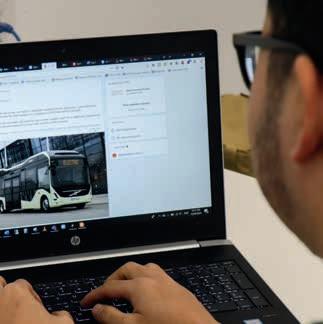
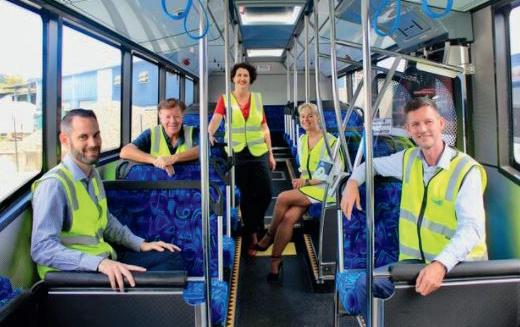
E-BUSES PART OF QLD ELECTION COMMITMENT
Ahead of the recent Queensland state elections, the Labor government announced a $23 billion investment to “supercharge roads, public transport and jobs”, with electric buses a key feature of the plan.
The announcement would see the Gold Coast and Logan areas set to become “the home of electric buses with a re-elected Palaszczuk government to supercharge the industry by building and trialling the technology in the growing region”, it stated.
Transport and main roads minister Mark Bailey says Gold Coast and Logan commuters would enjoy “a first-hand glimpse of the future” with the government to partner with local companies Bustech, Kinetic (Surfside Buslines) and Clarks (Clarks Logan City Bus Service), it confirms.
“We’ve built light rail, we’re rolling out the longest electric vehicle superhighway in the world, and from next year locals will build and ride electric buses that will be able to travel up to 300km from a single charge,” minister Bailey said.
DRIVING FORCE
Member for Waterford, minister for employment and small business, and minister for training and skills development Shannon Fentiman says 10 electric buses will be built on the Gold Coast and rolled out across Logan.
“Before Covid-19 hit, our community was a driving force behind two record years of public transport use,” minister Fentiman said.
“As part of Queensland’s plan for economic recovery, the Palaszczuk government is extending the busway in Logan thanks to the $749 million M1 upgrade through to Daisy Hill, and very soon we’ll see electric buses on our streets.”
Labor’s candidate for Currumbin Kaylee Campradt says on the Gold Coast electric buses would be used for the very first time on the 777 bus route between Broadbeach and the airport.
“We know buses play an important role in connecting our community, alongside the coast’s popular light rail and heavy rail,” candidate Campradt said.
“With this very important first step it’ll mean that by 2030 every new bus being rolled out across Queensland will be a zero-emissions bus, which is great news for our environment too.
“We’re building more than $4 billion in roads and transport for the region supporting more than 3,000 jobs, and with the electric bus market continually evolving, I think we’ll potentially see our community become the home of advanced vehicle manufacturing in Australia.”
Above: (L-R) Kinetic GM of SEQ Matt Campbell, Labor candidate for Burleigh Wayne Bartholomew, Labor candidate for Currumbin Kaylee Campradt, Surfside Buslines depot manager Allyson Robinson and minister for transport and main roads Mark Bailey.
BUSLINK NT COMMITS $660K TO IMPROVE SAFETY

NORTHERN TERRITORY WorkSafe has accepted a $660K ‘enforceable undertaking’ from Buslink NT Pty Ltd over the tragic death of a bus driver, who was fatally injured as a result of a bus rollaway incident in 2017.
NT WorkSafe alleged that despite numerous safety reports in the Australian bus industry highlighting the dangers of bus rollaway incidents and a Buslink bus being involved in a similar near miss days earlier, Buslink NT failed to implement adequate control measures.
NT WorkSafe further alleges this failure not only exposed the worker to the risk of death or serious illness, but also had the potential of placing the health and safety of their passengers and nearby pedestrians at risk, it states.
Buslink NT was charged with six offences under Section 32 of the Work Health and Safety (National Uniform Legislation) Act 2011 for failing in its duty to protect its drivers, passengers and the community from the risk of rollaway incidents, NT WorkSafe confirms.
The six charges have been withdrawn, but NT WorkSafe can commence proceedings if Buslink NT fails to comply with the terms of the undertaking, it explains.
NEEDS TO BE DONE
The activities in the enforceable undertaking to benefit the work health and safety of the workers, industry and the community are: • installing MobilEye collision avoidance systems in all 327 buses across
Buslink’s Northern Territory and
Queensland fleets • producing and distributing an instructional video on rollaway bus prevention for bus operators and drivers across Australia • working with a partner organisation to deliver a Northern Territory road safety campaign targeting distracted driving.
SAFETY BENEFITS
The Northern Territory’s work health and safety regulator Bill Esteves says the NT WorkSafe investigation found no evidence of ‘reckless conduct’ (Work Health and Safety [National Uniform Legislation] Act 2011 – Division 5, Offences and penalties, section 31 Reckless conduct – Category 1), which would have precluded the proposed undertaking from being accepted.
“The activities Buslink NT committed to in its enforceable undertaking have been assessed as likely to result in long-term, sustainable, measurable and tangible work health and safety benefits for the workplace, the industry and the community,” Esteves said.
“The expected work health and safety benefits will deliver outcomes superior to those expected from a court sanction, in particular the rollaway bus prevention video will ensure that learnings from Buslink NT’s experiences will be communicated across Australia,” Esteves added.
The financial obligations of the proposal are significant, and exceed penalties handed down for similar incidents under equivalent legislation by threefold, WorkSafe NT explains.
“Following the incident, Buslink NT has worked with the original equipment manufacturers to identify and implement additional engineering safety controls to further reduce the risk of a bus rollaway.
“All owners and operators of buses are urged to follow suit and review their systems to minimise or eliminate the risk of a bus rollway incident from tragically occurring again,” said Esteves.
BYD-BACKED E-BUS MANUFACTURING SITE ACQUIRED
A PROPOSED $700 million e-bus and e-vehicle manufacturing hub in the NSW Southern Highlands – backed by Chinese manufacturer BYD – is a step closer after ‘cleantech’ company TruGreen’s subsidiary Nexport secured a 51-hectare Moss Vale site.
As the Australian Financial Review (AFR) reported, the site south-west of Sydney aims to be at the forefront of a revival of local manufacturing, with as many as 2,000 new skilled jobs envisaged for the entity.
According to the AFR, Nexport chief executive Luke Todd confi rms the 51-hectare site at an industrial estate at Moss Vale in the Southern Highlands had been acquired for the manufacturing operation as it aims to become a big player in making electric buses and vehicles.
Nexport is the largest supplier of electric buses in Australia, it states, and uses electric vehicle technology developed by BYD.
Todd says the group was tapping into the big shift towards rebuilding Australia’s manufacturing base, and an industry of the future in electric vehicles.
Nexport “wanted to be part of a manufacturing renaissance, in line with the push by the federal government to ensure that an economic revival coming out of the pandemic was accelerated”, the AFR explains.
“It was already in the works but we have taken the opportunity to escalate and expedite and deepen our investment,” Todd said.
“We are 100 per cent Australian-owned.”
Other investors include Rod Casson, who built up a large motorcycle accessories business with his brother, which they sold in 2017 for $123 million to ASX-listed MotorCycle Holdings, the AFR states. The Halifax family offi ce has also taken a stake, it reports.
The New South Wales government has begun the long process of electrifi cation of its fl eet of 8000 buses, it adds.
Todd says the Moss Vale industrial production site itself would be a zero-emissions site and would be producing buses, trucks, vans and passenger vehicles when it was at full strength.
He said Nexport and TrueGreen were aiming to attract other “cleantech” businesses to the site.
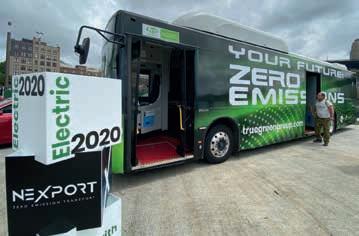
Above:
Nexport chief executive Luke Todd says the Moss Vale industrial production site itself would be a zero-emissions site and would be producing buses, trucks, vans and passenger vehicles when it was at full strength.


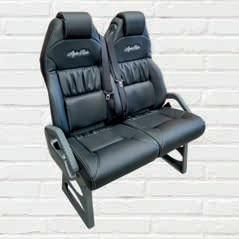

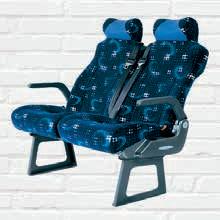

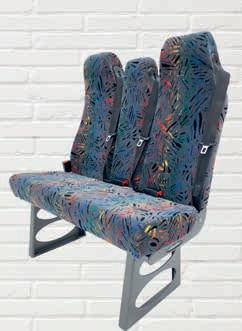

THE EXPLOSIONS
BRISBANE FADES OUT NATURAL-GAS BUSES
CLEAN DIESEL-technology buses will slowly replace Brisbane City Council’s aging ‘eco-friendly’ natural-gas run fleet, with reported explosions resulting in gas tanks only being half filled for safety, affecting efficiency, an ABC Radio Brisbane broadcast highlights recently.
As the basis for a printed story on www.abc.net.au called ‘Brisbane City Council swaps “exploding” gas-powered buses for diesel following gas cylinder explosions’, it states that the, “…new diesel buses are a stopgap, with Brisbane City Council’s long-term plans to use a mix of greener technologies, like electricity and hydrogen, still years off.”
It added: “Explosions in 2008 and 2012 led to policies that restricted gas buses operating with half-filled tanks, which meant they needed to be refuelled more often.
“The council is withdrawing the gas buses, which make up about a third of the fleet, and they will be off the roads by 2027,” it stated.
NO PROGRESS
As the report states, Brisbane public and active transport chair Councillor Ryan Murphy says natural gas “at its heart” was cleaner than diesel, but the former had not progressed in two decades.
As a result, the Euro 6 standard diesels – the council’s bus of choice – had “leapfrogged” gas buses, with lower particulate and nitrous oxide emissions, it says.
“By 2023 we want to have a procurement strategy in place that uses all those new technologies that we’ve been speaking about – hydrogen, electric – it’s going to be a mix of different technologies, but it’s got to work in Brisbane conditions,” Councillor Murphy said.
He explains that the council wanted electric and hydrogen-powered buses, but needed to make sure they would work in Brisbane’s climate and conditions, and at scale, the national-broadcaster ABC news report states.
Councillor Murphy pointed to the first Brisbane Metro bus that would arrive mid next year: an electric bus that could carry 150 passengers, reach 90 kilometres per hour, and fully charge in 4–6 minutes, the reports states.
The United Kingdom and France want diesel banned by 2040, and India wants it off roads by 2030, but Counsellor Murphy says those countries are taking “some pretty big bets” on their future public transport fleets and Brisbane would be more conservative, it quotes.
“By 2023 we want to have a procurement strategy in place that uses all those new technologies that we’ve been speaking about – hydrogen, electric – it’s going to be a mix of different technologies, but it’s got to work in Brisbane conditions,” he said.
“Diesel is going to need to be in the mix in our public transport fleet for the foreseeable future.”
Above and Below:
As the report states, Brisbane public andactive transport chair Councillor Ryan Murphy says natural gas “at its heart” was cleaner than diesel, but the former had not progressed in two decades. Brisbane opposition leader Councillor Jared Cassidy (ALP) says natural gas buses – introduced under Labor Lord Mayor Jim Soorley – had carried millions of passengers for two decades.
“At the time they were cutting-edge technology,” he said, though “conceded it was disappointing that two gas cylinders had exploded in the fleet”, the report states.
Councillor Cassidy supported the council’s plan to import 60 electric buses for Brisbane Metro, but insisted it needed to be more ambitious and power its entire 1,200-strong fleet with electric or hydrogen, it explains.
Councillor Cassidy says bus manufacturer Volgren, based in Brisbane, had the capability with its international counterparts to develop and build electric buses for the city’s non-Metro routes, the report confirms.
“We’ve got a fleet of 1,200 buses,” he said.
“We’d be one of the very few of the bus operators in Australia who could lead the way on introducing electric buses on a mass scale.
Councillor Murphy says replacing the city’s diesel buses “overnight” would be financially irresponsible and leave working buses with “nothing to do”.


ADL DELIVERS E-BUSES TO AUCKLAND
AUCKLAND TRANSPORT (AT) and ferry operator Fullers360 now has six new electric buses for use on Waiheke Island, New Zealand, thanks to a delivery from Alexander Dennis Limited (ADL), which also has renewed its partnership with New Zealand manufacturer Kiwi Bus Builders.
According to ADL – owned by North America’s New Flyer Industries – it will supply an additional two electric buses to Fullers360 subsidiary Waiheke Bus Company before Christmas, allowing half of all buses on the island to be converted to zero-emission operation.
At the launch event, attended by the Mayor of Auckland and the British Consul General in Auckland, ADL announced its renewed partnership with local manufacturer Kiwi Bus Builders, it adds. This will now include the assembly of electric buses, which for the New Zealand market had until now taken place overseas, it confi rms.
In addition to two-axle models like those for Waiheke Island, the partners will produce 12.6m-long, three-axle electric buses, which ADL has designed for the specifi c requirements of bus operation in New Zealand by carrying 78 passengers without the requirement of an overweight permit, a fi rst for New Zealand, it states.
As the country prepares to fully transition its bus fl eet to zero-emission vehicles by 2035, their local assembly will support up to 100 jobs at Kiwi Bus Builders, ADL explains.
ADL’s general manager for New Zealand Tony Moore said: “We have been a major supplier to New Zealand for almost ten years and during this time have already supplied 500 vehicles with the help of our friends at Kiwi Bus Builders. As Auckland Transport and other transport authorities prepare to move to a zero-emission fl eet, we are renewing this partnership in a clear sign of our support for New Zealand jobs and our commitment to this market.”
Kiwi Bus Builders managing director Richard Drummond said: “The Enviro200 range of electric buses are not only designed for our local requirements here in New Zealand, but are also built in this country. With investment in updated build techniques, we will be able to scale up our production to meet demand from Auckland and elsewhere in New Zealand as the fl eet transformation gets under way ahead of the 2035 zero-emissions target.”


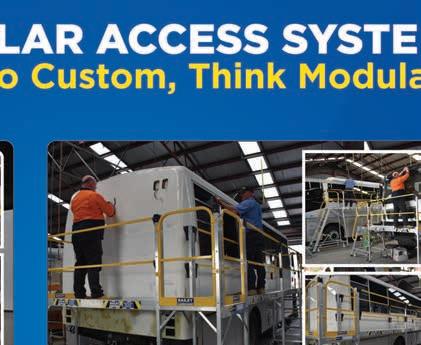
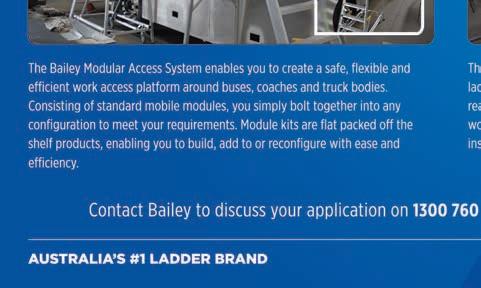
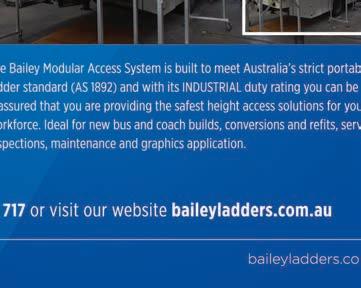
YUTONG E-BUS FOR EAST AUCKLAND, NZ
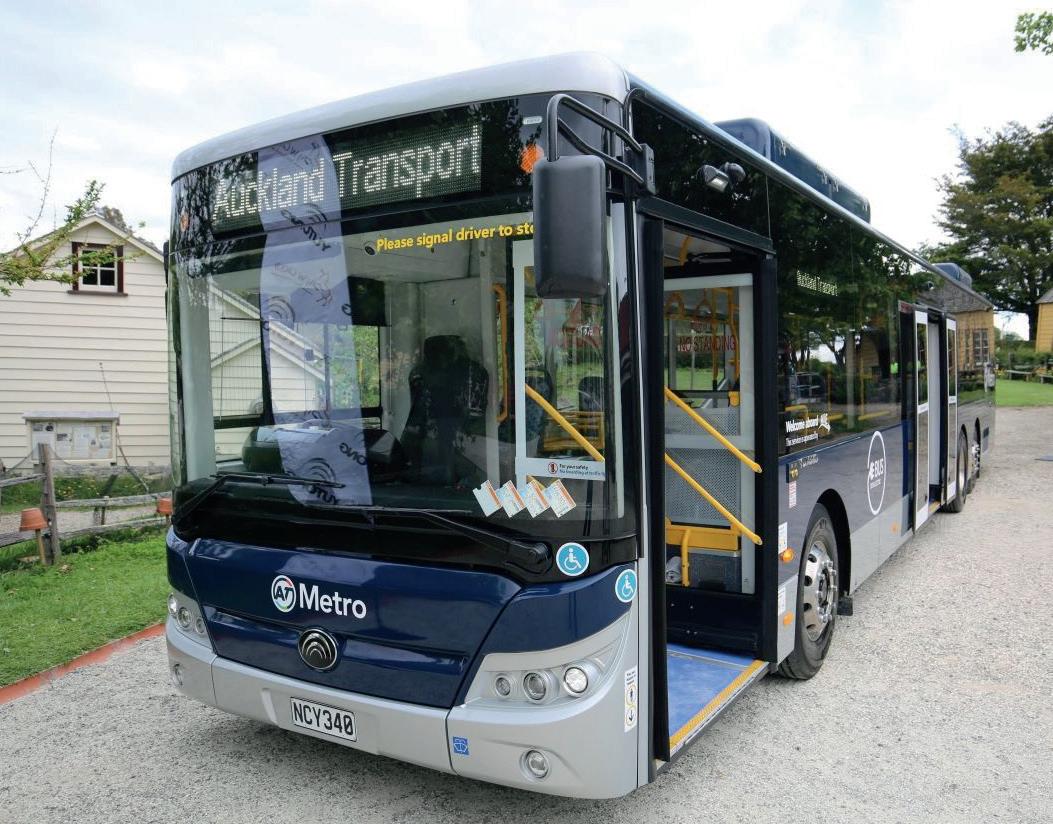
EAST AUCKLANDERS will soon be able to enjoy a quiet, zero-emissions bus experience thanks to Auckland Transport (AT) and local Transdev subsidiary Howick and Eastern, the companies have announced.
Purchased by AT, the new state-of-the-art Yutong E13 three-axle electric bus will be operated by Howick and Eastern on routes throughout the Eastern suburbs and to and from the City, catering for up to 78 passengers per trip, Transdev confi rms.
General manager of Howick and Eastern Sheryll Otway says the new three-axle vehicle would provide a superior experience for both customers and drivers.
“The new vehicle is designed for passenger comfort, offering a smoother, quieter and more sustainable journey for customers,” Otway said.
“The bus is the fi rst extra-large electric vehicle on the road in Auckland, and our drivers are very excited to have been given the opportunity to get behind the wheel,” she explained.
2040 GOAL
Transdev Australasia CEO Luke Agati congratulated Auckland Transport for its ambition to deliver a fully zero-emission bus fl eet by 2040.
“Globally, Transdev is a leader in zero-emissions mobility and we are proud to be partnering with government agencies, including AT, to bring new fl eet and technologies to more places,” Agati said.
“By replacing existing legacy fl eets with new zero-emissions vehicles we can work together to reduce our carbon footprint, improve the long-term sustainability of the transport network, and make public transport an even easier choice for customers,” he added.
Auckland’s newest electric vehicle has been specifi cally designed to meet New Zealand conditions and is powered by a 422kW battery, with the vehicle capable of travelling up to 400 kilometres on a single charge, Transdev confi rms.
Above:
Auckland’s newest electric vehicle has been specifi cally designed to meet New Zealand conditions, says Transdev Australasia.
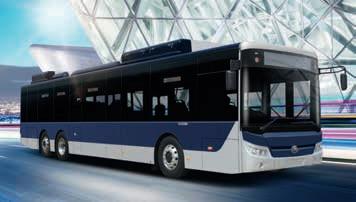
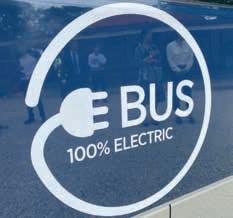
SITA BUSLINES REBRANDS TO TRANSIT SYSTEMS VICTORIA
MORE THAN 18 months after Transit Systems acquired Melbourne-based Sita Buslines – marking the company’s fi rst foray into the state – the rebranded Victorian bus entity is now offi cially known as Transit Systems Victoria, it was announced recently.
The company says it is extremely pleased to launch the new-look Sita Buslines following the acquisition of the group into the Transit Systems portfolio in April 2019.
Transit Systems has successfully transitioned more public transport contracts than any other provider in Australia, and is renowned for innovation with leading on-demand services, including ‘turn up and go’ services, and zero-emission transport outcomes already in operation, the company states.
Clint Feuerherdt, CEO SeaLink Travel Group, which wholly owns the Transit Systems subsidiary, says the group is pleased to see the Transit Systems network presence expand into Victoria.
“We have been successfully running the operations in Victoria for over 18 months now, and the time was right to consolidate the branding into the Transit Systems network,” Feuerherdt explained.
“It is very much business as usual on the ground, but it demonstrates our commitment to the Victorian transport network as global operator with local knowledge,” he said.
Transit Systems has a fl eet of electric buses running as part of a trial with Transport for New South Wales, as well as being one of the most experienced hydrogen fl eet operators, experience gained in the globally renowned Transport for London network, it confi rms.
“We are driven by the concept that the more comfortable, convenient, sustainable and reliable we make public transport, the more we can increase patronage, reduce road congestion and decrease emissions – improve performance measurements and outcomes for our clients and the community,” said Feuerherdt.
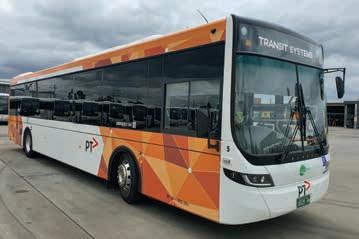
Above:
“We look forward to seeing the Transit Systems fl eet moving around Victoria, and we’re excited by the possibilities in the state,” said Clint Feuerherdt, CEO SeaLink Travel Group.
HIGH SPEC, RIGHT PRICE, AVAILABLE NOW



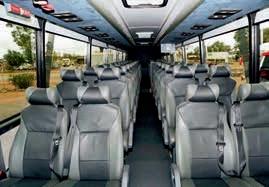

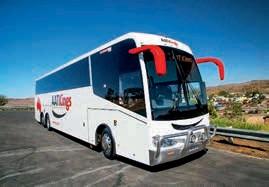
6 x 2013 Scania K440EB
Coach Concepts 14.5m body, 58 Styleride lap sash seat belted recliners in leather, guide seat, Thermo King auto heat cool A/C, 2 door entry, mid toilet, tachograph, Hanover electronic sign, full service history, plus more, travelled 715-785,000klm.
$200,000+GST each
PLUS MANY MORE, CHECK OUT OUR WEBSITE AT www.roddhoodsbusandcoachsales.com Mobile: 0417 699 980 - Email: rodd.hood@bigpond.com.au
$100 MILLION NSW REGIONAL JOB PUSH
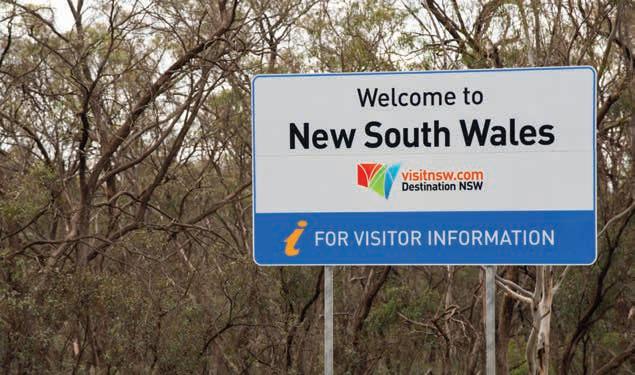
SUPPORT GRANTS of up to $10 million under a new NSW government program designed to create more jobs across the state is open to businesses in the transport and tourism sector, a government spokesperson for Deputy Premier John Barilaro confirms.
Existing regional businesses can apply for funding, as can businesses located in metropolitan areas, interstate or overseas that want to establish operations in regional NSW.
For the purposes of this fund, regional NSW is defined as any area in NSW that is outside of Greater Metropolitan Sydney, Newcastle or Wollongong, the government clarifies.
The idea behind the plan is regional businesses that can increase employment by expanding production lines or relocate operations to regional NSW from interstate or overseas will have access to the grants.
Deputy Premier John Barilaro says the $100 million Regional Job Creation Fund, announced recently, will provide businesses with the money they need to fast track expansion plans, to create jobs and stimulate the local economy.
“NSW businesses have demonstrated remarkable resilience in the face of drought, bushfires and Covid-19 and this unprecedented funding program will help them thrive instead of just survive,” Deputy Premier Barilaro said.
“I have set an ambitious target for the Regional Job Creation Fund to create at least 5,000 new direct jobs across regional NSW in the next three years by providing businesses with the equipment, infrastructure and capacity they need to create new opportunities and attract new customers.
“Regional NSW is the engine room of our state and this program will deliver immediate economic stimulus as businesses leverage new opportunities by providing work for tradies and suppliers.
“Regional NSW’s abundance of natural resources, its pool of skilled labour and the NSW government’s record infrastructure spend is providing businesses and industry with everything they need to succeed.”
Deputy premier Barilaro says the Regional Job Creation Fund will provide grants between $100,000 and up to $10 million to undertake
Above:
NSW Deputy Premier Barilaro says the Regional Job Creation Fund will provide grants between $100,000 and up to $10 million to undertake projects that create jobs.

FATHER AND SON duo David and Stuart Woodward are collectively celebrating 40 years with Volvo Bus Australia this year, with the ‘veterans’ reaching 25- and 15-year milestones, respectively.
The 2020 career milestones for the stalwart Woodward pair highlights the integral support to the Volvo Bus Australia team they’ve provided and their nurturing of vital relationships with customers and industry stakeholders, the company confirms.
projects that create jobs, including those that: • replace, upgrade or adapt existing plant or equipment, including technology or energy efficiency upgrades • enable existing regional NSW businesses to establish an additional production line • relocate a business from interstate or internationally to regional NSW, or onshore an activity currently being undertaken overseas to regional NSW • develop new tourism experiences and attractions to create new demand in a region.
TRANSPORT AND TOURISM
When ABC magazine contacted the deputy premier’s office for further information, a spokesperson for said: “The NSW government’s $100 million Regional Job Creation Fund will help to create at least 5,000 new jobs across the next three years by supporting existing regional businesses and encouraging interstate and international business to invest in the regional NSW.
“The fund will assist businesses in key and engine industries including transport and logistics, agriculture, manufacturing, defence technology and medical, by co-funding projects providing businesses with the money they need to fast track expansion plans that will create jobs and stimulate local economies.
“Projects include the expansion or extension of existing buildings, facilities or production lines or the construction of new standalone buildings or facilities. Projects must create at least five new ongoing jobs.
“Existing regional businesses can apply for funding, as can businesses located in metropolitan areas, interstate or overseas that want to establish operations in regional NSW.
“For the purposes of this fund, regional NSW is defined as any area in NSW that is outside of Greater Metropolitan Sydney, Newcastle or Wollongong,” they stated. CONTACT INFO

The NSW state government says it is encouraging, “…businesses to discuss their proposal with the Department of Regional NSW by contacting 1300 679 673.”
For further information about the program guidelines and eligibility, visit www.nsw.gov.au/RCJFund or visit https://www.investregional.nsw.gov.au/ investment-support/regional-job- creation-fund/.
Applications are now open and will close on May 14, 2021, or when program funding is fully allocated, the government explains.
Commencing his time with Volvo Bus Australia in April, 1995, David Woodward joined the team as Zone Service manager NSW, servicing NSW and NT customers. He later assumed the role of Regional Service manager for the Sydney metro area, where he serviced a large number of customers across city, school, charter and coach operations, before moving into the newly created role of National Competency manager in March this year, Volvo Bus states.
Overall, Woodward Snr. has 44 years of experience in the bus and coach industry since landing his first industry job as an apprentice mechanic in 1976. Since then he has developed outstanding skills in his field and has become regarded as a technical guru in the industry, Volvo explains.
LIKE FATHER, LIKE…
Passion and dedication to the bus and coach industry clearly runs in the Woodward family as David’s son, Stuart, followed in his father’s footsteps and began his career with Volvo Bus Australia a decade later in 2005, Volvo Bus confirms.
Having been immersed in the industry and the close-knit bus and coach community since he was a child - where he attended various bus shows and events – Woodward Jnr. has had a passion for buses and coaches for as long as he can remember, he says.
Stuart began his career with Volvo Bus Australia as an apprentice heavy diesel technician and later transitioned to Service Advisor with Volvo Commercial Vehicles Sydney. He spent seven years as Contract and Technical Support manager for Volvo Bus in WA, and moved into his current role as regional sales manager for NSW in July 2019. VALUABLE ASSETS
Both David and Stuart’s extensive industry experience, exceptional customer relationship skills and high level of respect from the industry make them valuable assets to Volvo Bus and its customers, the company states.
“We are very fortunate to have had David and Stuart supporting the Volvo Bus Australia team throughout the years,” said David Mead, acting general manager Volvo Bus Australia.
“Not only have they provided invaluable service to our customers, but they are truly passionate about the bus and coach industry in Australia.
“Their career milestones are a testament to their unwavering dedication to the organisation and we are very grateful to have them playing such key roles within the Volvo Bus team,” stated Mead.


WWF-BACKED POSTCOVID RECOVERY HIGHLIGHTS ‘CLEAN’ E-BUSES
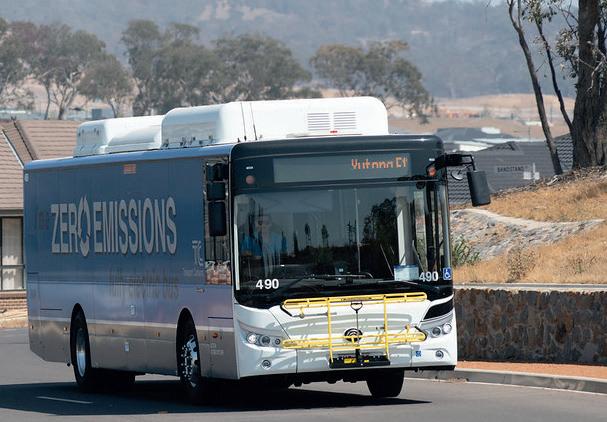
IN A MOVE to help stimulate Australia’s pandemic-stymied economy, a World Wildlife Fund (WWF) Australia campaign video promoting a $2 billion recovery focusing on green technology has crucially thrust electric buses further into the mainstream spotlight, recently.
Renewable heavy vehicles specialist Electromotiv is fronting the WWF Australia campaign, which evolved after a WWF-commissioned report by EY suggested a clean stimulus package could create more than 100,000 jobs in a post-Covid-19-led recovery. And a central element to the initiative is a $240 million investment in electric buses.
In the video released by WWF this week, Electromotiv’s managing director and co-founder Toby Roxburgh explains that Australia is well-placed to take advantage of renewable energy and to manufacture the buses that will replace their fossil-fuel precursors.
“Australia has a fantastic renewable energy resource; we’re the perfect location for zero-emission buses. The technology is there and we can make them in Australia,” Roxburgh said in the video that shows Transport Canberra’s Yutong E12 electric trial bus travelling the streets.
Roxburgh believes the campaign could not have come at a better time, saying Australian governments have until recently been reluctant to add zero-emission buses to their fl eets, but that’s changing rapidly.
“The demand for electric buses is exponential. In the fi rst quarter of this year we did nine electric buses for Auckland. We’re now working on our next 50, our next hundred and our next 200 vehicles,” he said.

IN TRANSITION
Earlier this year, Transport for New South Wales announced it would transition its 8000-strong bus fl eet to zero-emission technology by 2050. In 2019, Brisbane City Council appointed a bid team offering a high-capacity electric vehicle and infrastructure combination to service its $944 million Brisbane Metro project.
WWF Australia Energy Transition manager Nicky Ison says the investment in electric buses outlined in the EY report could double local manufacturing jobs in the bus sector.
“We can rebuild our economy in a way that sets up Australia for prosperity in a world hungry for a low-carbon future,” Ison said.
“Secure jobs, cleaner air, improved health and a nation envied as a world leader in renewables – they are all within our grasp. Australians will prosper and thrive under a renewables-led recovery,” Ison explained.
Above:
Roxburgh believes the WWF Australiabacked campaign could not have come at a better time, saying Australian governments have until recently been reluctant to add zero-emission buses to their fl eets, but that’s changing rapidly.
THE WOT!?!
TAKING THE P***
This was the Edinburgh News’ front page on November 9 – Lothian Buses drivers have been accused of dumping bottles of their urine in bushes on the aptly named Bogwood Road in the village of Mayfi eld near Edinburgh. “We have worked with local authorities and other partners to put in place arrangements for toilet facilities along our routes across Edinburgh and the Lothians,” said Lothian Buses in its defence – raising the question of where they thought bus drivers were relieving themselves previously. And one would hope that the bus is indeed stopped before such matters are taken care of.
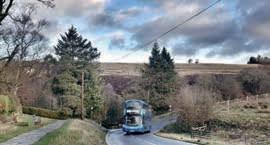
RAMBLE ON
Things are a bit happier south of the border in North Yorkshire, where a three-hour double-decker ride over the moors has been named the UK’s most scenic bus route in a competition run by Bus Users UK. The 840 route between Whitby and Leeds cruises past the medieval city walls of York before rambling through the rolling Yorkshire countryside to fi nish up at the coast and a dramatic view of Whitby’s ruined gothic abbey. Though, you probably will need a wee after sitting on the bus for three hours… Spare bottle, anyone?
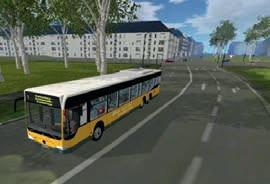
BORN TO BUS
Looking for Christmas present ideas? Bus Driver Simulator has now been released on your console of choice, offering “a high level of realism, buses from various countries and two faithfully reproduced cities (Cologne, Germany and Serpukhov, Russia)”. If you just can’t get enough of it during work hours, it includes road events such as traffi c jams and accidents, the need for fuel stops and variable weather, though it doesn’t seem to have kangaroos rocketing out of nowhere, possibly to the relief of our European counterparts.
BUS STOP KING LONG IS SIMPLY BETTER VALUE
FULLY SUPPORTED

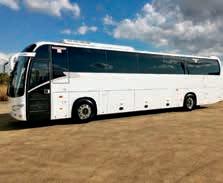
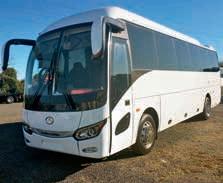
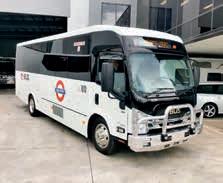
NEW KING LONG 35-39 SEATER
Cummins UK 6.7L ISBe 250HP, ZF 6 speed automatic, Independent front suspension, 39 fixed high back cloth seats with seatbelts.

$POA Perfect School Bus
NEW KING LONG 12M 53-57 SEATER
$POA In Stock Now
NEW KING LONG 41-45 SEATER
Cummins UK 6.7L ISBe 285HP, ZF 6sp automatic, independent front suspension, 41 reclining high back leather seats with seatbelts.
$POA Perfect Tour Bus
NEW ISUZU I-BUS 2632 SEATER MINIBUS
Isuzu turbo diesel, AMT transmission, 26-32 fixed seats with seatbelts, front engine bus.
$POA Perfect School Bus



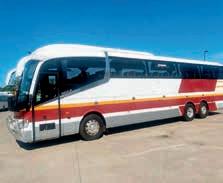
NEW YUTONG 35-39 SEATER COACH
2020 models just arrived, choice of 35 - 39 fixed or reclining seats. 250HP Cummins, Allison auto.
Ready to go Call Now!
NEW KING LONG 13M 57-61 SEATER
$POA Class Leading Ride
2013 IVECO/KING LONG 53 & 57’S
Both 53 and 57 belted available,TK Air, good bins, Cummins, Allison, Auto, Bright’s bar.
Value at $135,000 + GST ono
2014 IVECO IRIZAR 13.5M COACH
What a coach! 52 belted reclining seats, toilet, DVD/ TV screens, Alloys, Steerable lazy, big bins, ready to go!
Priced at $245,000 + GST ono









